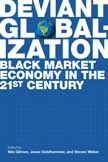Through essays contributed by leading experts and scholars, Deviant Globalization argues that far from being marginal, illicit activities are a fundamental part of globalization. Narcotrafficking, human trafficking, the organ trade, computer malware, transnational gangs are just as much artifacts of globalization as are CNN and McDonald’s, free trade and capital mobility, accessible air travel and container shipping. In fact, almost every technology, process, and regulation that enables mainstream globalization is an enabler of deviant globalization.
This unique book explains why understanding deviant globalization as a systemic and integral part of globalization is crucial for setting up policies that will maximize the benefits of globalization and minimize its ill effects. Going beyond the usual pro/con arguments about globalization, Deviant Globalization seeks to initiate a critical debate about the choices it presents to governments, firms, supra-national organizations, and individuals. An accessible treatment of the underbelly of globalization, the book offers a systematic treatment of the difficult policy choices that it creates and describes a much more complex and symbiotic relationship between illicit and mainstream globalization.
Here are the endorsements:
This carefully curated selection of provocative and accessible essays helps us come to grips with the dark underside of the global economy, and sheds new light on what we can and should do about it. – Peter Andreas, Professor of Political Science and International Studies, Watson Institute for International Studies, Brown University
Deviant Globalization shows the dark side of global trade, the illicit flows, black markets, and trafficking in drugs and human bodies that are as much a part of the new world (dis)order as multinational corporations and instant financial transfers. Contributors push us towards a more complete moral and political assessment of globalization and the development of better theories to account for power relations, inequalities, and collateral damage. – Craig Calhoun, President, Social Science Research Council
In the shadows of the move to a globalized economy, in places its uncritical partisans would rather not look, an equally new and equally globalized set of phenomena has arisen. In this pathbreaking book, Nils Gilman, Jesse Goldhammer, and Steven Weber have gone far beyond registering the existence of ‘deviant globalization.’ They have theorized it, and shown that what crops up at the intersection of ethical disparity and regulatory inefficiency is now a permanent feature of global affairs. Observers of the world will benefit from this insight, while teachers and students will gratefully thank the editors for compiling the evidence in one place. – Samuel Moyn, Columbia University, author of The Last Utopia: Human Rights in History.



 'Choose Your Bearing: Édouard Glissant, Human Rights and Decolonial Ethics' is now available for pre-order!
'Choose Your Bearing: Édouard Glissant, Human Rights and Decolonial Ethics' is now available for pre-order!  Grab your copy and save 30% OFF using the code NEW30 at checkout :
Grab your copy and save 30% OFF using the code NEW30 at checkout :